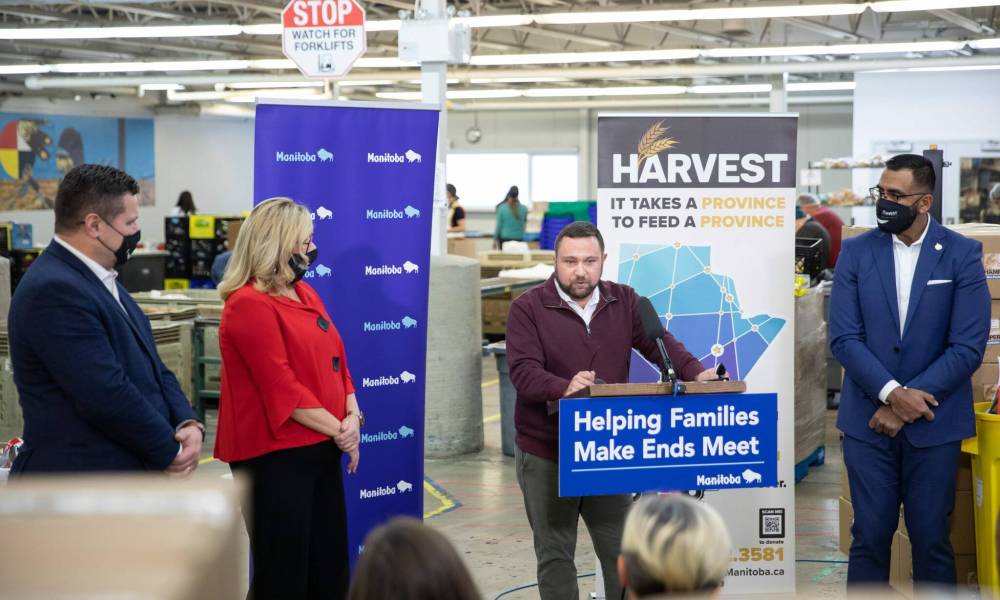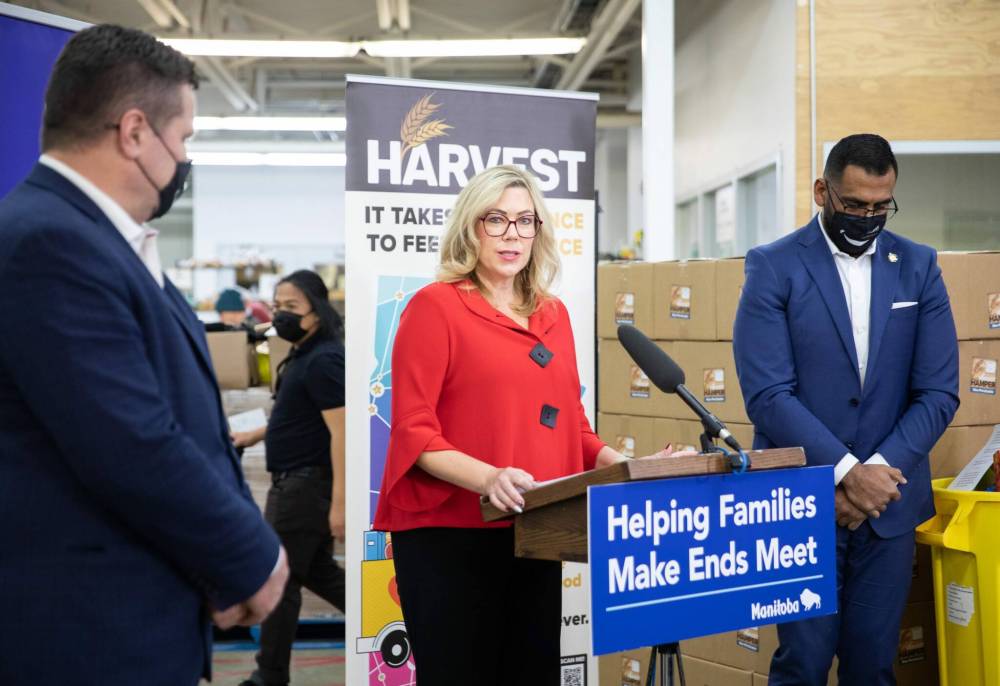Harvest Manitoba gets $3-M grant boost from province
Advertisement
Read this article for free:
or
Already have an account? Log in here »
To continue reading, please subscribe:
Monthly Digital Subscription
$19 $0 for the first 4 weeks*
- Enjoy unlimited reading on winnipegfreepress.com
- Read the E-Edition, our digital replica newspaper
- Access News Break, our award-winning app
- Play interactive puzzles
*No charge for four weeks then billed as $19 plus GST every four weeks. Offer only available to new and qualified returning subscribers. Cancel any time.
Read unlimited articles for free today:
or
Already have an account? Log in here »
Hey there, time traveller!
This article was published 18/12/2022 (737 days ago), so information in it may no longer be current.
An unprecedented number of Manitobans are turning to food banks to make ends meet, as rising costs and demand put intense pressure on the community aid organizations to respond.
Harvest Manitoba chief executive officer Vince Barletta said about 40,000 people (including roughly 15,000 children) across the province used a food bank in November. Compared to last year, 40 per cent more households are relying on food banks to stock their pantry, he said.
“We need all the help of all Manitobans at this time, because the need that we’re facing is absolutely unprecedented,” Barletta said, speaking to media and food bank partners at a funding announcement Monday afternoon in Winnipeg.

JESSICA LEE / WINNIPEG FREE PRESS
“We need all the help of all Manitobans at this time, because the need that we’re facing is absolutely unprecedented,” said Vince Barletta, president and CEO of Harvest Manitoba.
Barletta attributed the increased demand for emergency food to inflation and rising interest rates, which are cutting into family budgets, but are also hurting the non-profit organization’s bottom line.
“Inflation hurts those who have the least the most,” Barletta said. “For many people, that was just the final straw that has led them to go to food banks.”
On Monday, the provincial government said it will provide a $3-million grant to Manitoba Harvest to purchase food to be distributed through food banks across the province.
The funding will also help Harvest cover the increased costs of serving a rapidly growing number of people, including wages, transportation and fuel, and assist organizations in need.
Barletta said Harvest has been forced to buy most of the food it distributed this year. Compared to three years ago, no food warehoused at the Winnipeg Avenue facility would have been purchased, he noted.
Meanwhile, a wider segment of the population is in greater need. About 25 per cent of food bank users are employed and an increasing number of clients are from two-income households, Barletta said.
“At the same time as this funding is coming forward, we look forward to working with the Manitoba government, to working with our community partners in the year ahead to get the demand for food banks to go down,” he said.
“We can’t be back here next year having this same announcement.”
Families Minister Rochelle Squires said the one-time grant addresses an immediate need in the community, but more is required to address poverty in the province.
“Today was about ensuring that no Manitoban goes hungry. We’re going into the holiday season. It’s really difficult time of year for many families, and we want to make sure all Manitobans have the food that they need,” Squires said.
According to Statistics Canada, Manitoba had the fourth-highest poverty rate of all the provinces, based on 2021 census data. The poverty rate of 8.6 per cent was higher than the national average of 8.1 per cent.

JESSICA LEE / WINNIPEG FREE PRESS
Families Minister Rochelle Squires said the one-time grant addresses an immediate need in the community, but more is required to address poverty in the province.
In Winnipeg, 16 per cent of Indigenous people were in poverty, according to Statistics Canada.
The Progressive Conservative government has made some progress on poverty reduction, Squires argued, pointing to recent changes to minimum wage, welfare rates and employment programs for single parents.
“Since we formed government (in 2016), we’ve pulled 35,000 children out of poverty. It’s not enough,” Squires said. “And now we’re seeing challenging trends and so that work will definitely continue.”
For the first time in about 20 years, the Manitoba government increased monthly welfare rates by $50 for adults without dependent children and an $25 for disability claimants.
The province also announced it will index the basic needs amount to inflation for people with disabilities who are enrolled in a new income support program, beginning in April.
Squires said her department is studying whether general assistance and welfare rates should also increase on an annual basis.
On Monday, Squires announced 29 grant recipients through the Food Security Fund. The $1.75-million fund was first announced in August, and will support organizations delivering food security programs.
danielle.dasilva@freepress.mb.ca

Our newsroom depends on a growing audience of readers to power our journalism. If you are not a paid reader, please consider becoming a subscriber.
Our newsroom depends on its audience of readers to power our journalism. Thank you for your support.
History
Updated on Monday, December 19, 2022 8:40 PM CST: Fixes name of Harvest Manitoba in headline





